'Words are useless without action' 



[Slogan attributed to Andreas Baader]

'L'ART EST INUTILE', * Ben Vautier; 'L'EXPOSITION EST INUTILE', *Marion Pipper
* [from the catalogue L'ART EST INUTILE [ AVANTGARDEKUNST / ARTE D'AVANGUARDIA 1960 -1980] for the exhibition curated by Wolfgang Fetz, Gerald Matt and Marion Pipper, held at Bregenzer Kunstverein, Bregenz; AR/GE, Kunst Galerie Museum, Bozen; AR /GE Kunst Galleria Museo, Bolzano 1992-1993
 'We wanted to be radical, brave, pioneers; we considered ourselves to be a vanguard. We over estimated ourselves ridiculously, indulging in the illusion that a revolution was thinkable in the prosperous Federal Republic. In this light we were self-timers who acted cut off from reality in a void. We lived a sort of armed existentialism [...] The photographs we took in Paris are rarities. In the late 60s everything for us was geared towards political intervention; art was considered to be 'bourgeois' or suspicious. Aesthetics were unimportant, what mattered were content rather than form. The pictures from Paris look like holiday snaps. At the same time they document the farewell to legality and the assumption of an inconspicuous normality. Gudrun had her hair cut and dyed, while Andreas adopted cropped hair and pressed trousers. Not much later they took the cover names 'Hans' and 'Grete'. '
'We wanted to be radical, brave, pioneers; we considered ourselves to be a vanguard. We over estimated ourselves ridiculously, indulging in the illusion that a revolution was thinkable in the prosperous Federal Republic. In this light we were self-timers who acted cut off from reality in a void. We lived a sort of armed existentialism [...] The photographs we took in Paris are rarities. In the late 60s everything for us was geared towards political intervention; art was considered to be 'bourgeois' or suspicious. Aesthetics were unimportant, what mattered were content rather than form. The pictures from Paris look like holiday snaps. At the same time they document the farewell to legality and the assumption of an inconspicuous normality. Gudrun had her hair cut and dyed, while Andreas adopted cropped hair and pressed trousers. Not much later they took the cover names 'Hans' and 'Grete'. '
[from Baader Meinhof, Pictures on the Run 67 -77; SelbStauslšser, Self-Timer, Astrid Proll]




God
For some of the Israeli soldiers, bashing the Palestinians made them feel important. 
"You feel that you are the law. You are the law.  You are the one who decides," another soldier said.
You are the one who decides," another soldier said.
"As though from the moment you leave the place that is called Eretz Yisrael [Israel] and go through the Erez checkpoint into the Gaza Strip, you are the law. You are God."
With such pleasure in power, soldiers said, nothing was prohibited.
One soldier described an incident when a Palestinian passer-by was shot for no fault of his.
"We were in a weapons carrier when this guy, around 25, passed by in the street and, just like that, for no reason - he didn't throw a stone, did nothing - bang, a bullet in the stomach, he shot him in the stomach and the guy is dying on the pavement and we keep going, apathetic," he recalled.
"No one gave him a second look."
A fourth soldier revealed how he had "no problem" abusing Palestinian women in particular, recalling when he brutally beat one woman for throwing a clog on him.
"I kicked her here [pointing to the crotch], I broke everything there. She can't have children."
Another woman's fault was to spat at him.
"I gave her the rifle butt in the face. She doesn't have what to spit with any more."













'He looked her full in the face, and how beautiful she was, with her gray eyes, like the cold sky. In her dark hair sparkled the diamond coronet, like a radiance. He suddenly felt, felt by a kind of intuition, that this grand creature was not merely a being destined to perpetuate the race, but the strange and mysterious product of all our complicated desires which have been accumulating in us for centuries but which have been turned aside from their primitive and divine object and have wandered after a mystic, imperfectly perceived and intangible beauty. There are some women like that, who blossom only for our dreams,  adorned with every poetical attribute of civilisation, with that ideal luxury, coquetry and aesthetic charm which surround woman, a living statue that brightens our life.' [from Useless Beauty, Guy de Maupassant]
adorned with every poetical attribute of civilisation, with that ideal luxury, coquetry and aesthetic charm which surround woman, a living statue that brightens our life.' [from Useless Beauty, Guy de Maupassant]

'Reason's call to t he intellect forgets that the human condition is intellect and fantasy. The quest for the supernatural does not stem from an excessive but from a limited imagination built by millenniums of exploitation and oppression: the incapacity to be free on Earth incites humans to situate freedom out of this world. Dreams and desires are displaced persons. This is the stuff religion is made of. ' [from The 7th Lettre de Troploin June 2006 called Le PrŽsent d'une Illusion,]
he intellect forgets that the human condition is intellect and fantasy. The quest for the supernatural does not stem from an excessive but from a limited imagination built by millenniums of exploitation and oppression: the incapacity to be free on Earth incites humans to situate freedom out of this world. Dreams and desires are displaced persons. This is the stuff religion is made of. ' [from The 7th Lettre de Troploin June 2006 called Le PrŽsent d'une Illusion,]
[...] As such, Meillassoux will write, '[w]e are trying to grasp the sense of the following paradox : the more thought arms itself against dogmatism, the more defenseless it becomes before fanaticism' (AF, 48). Philosophy which is born with the rejection of mythos now finds that it must suffer the proliferation of superstition, religious fanaticism, and ideology everywhere due to its own internal constraints. The question of whether or not we can think a world without thought is thus the question of whether or not philosophy is possible. [Correlationism and the Fate of Philosophy, Posted by larvalsubjects June 13, 2008 at 7:52 pm]
: the more thought arms itself against dogmatism, the more defenseless it becomes before fanaticism' (AF, 48). Philosophy which is born with the rejection of mythos now finds that it must suffer the proliferation of superstition, religious fanaticism, and ideology everywhere due to its own internal constraints. The question of whether or not we can think a world without thought is thus the question of whether or not philosophy is possible. [Correlationism and the Fate of Philosophy, Posted by larvalsubjects June 13, 2008 at 7:52 pm]
' They are landscapes without genealogy, heterotopias that insist on the freedom to call into reality something that has not yet existed, which cannot exist. '
On Jochen Klein's paintings [Abandoned Painting, Nick Mauss, Artforum October 2008] 













'Far from seeing in criticism a threat to consistency, the examination of the determinate conditions for absolute unreason should strive to multiply objections, the better to reinforce the binding of its argumentative fabric. It is by exposing the weaknesses in our own arguments that we will uncover, by way of a meticulous, step-by-step examination of the inadequacies in our reasoning , the idea of a non-metaphysical and non-religious discourse on the absolute.'
, the idea of a non-metaphysical and non-religious discourse on the absolute.' 
From After Finitude, An Essay on the Necessity of Contingency, Quentin Meillassoux 




The virtue of transcendentalism does not lie in rendering realism illusory, but in rendering it astonishing, i.e. apparently unthinkable, yet true, and hence eminently problematic (AF 27). As articulated by Meillassoux, '...'correlation[ism]' [is] the idea according to which we only ever have access to the correlation between thinking and being, and never to either term considered apart from the other' (AF, 5).
On incommensurability and the smile 
Thought and action are together useless if incapable of escaping the invisible and severe circle of correlationism in which they inevitably conform to another use. Terms 'use' and 'useless' are in a difficult correlation, paired, not in contradiction, not always opposed in meaning, reaching out from the mutual desire for some practical consistency, or authenticity, whilst driven to / from the absolute, something 'in-itself' -in human terms- 'exemplary' , perspectives must be fashioned that displace and distort, estrange the world...as indigent and distorted as it will appeared [ or appeared one lost day] in the messianic light, but unobserved. caught in the restless concern not to waste our lives
caught in the restless concern not to waste our lives insufficient time, moments inauthentic or useless 'for me', the everyday communication which practices the dictum: 'include me out!'. If the authentic were unthinkable, both terms are to be defaced, yet again under a false light, or somewhere dislocated between good and bad faiths, corruption of will. However is it given to 'reason' alone to covert and correlate everything as contingent, without absolute, the 'in-itself', the inaccessible Real? The metaphysical question applies itself like glue to the paradox of the authentic / inauthentic. The unthinkable is revolution, the revolution unthinkable, contingent of fuzzy logic and an inverse beauty of necessity, existence in -itself. In striving for authenticity in the future what is denied by the subject? What is unthought in Althusser's 'interpellation'? What has been blocked in the continuous present? Under the skin the body is an overheated factory...producing itself indefinitely, evacuating all moral content, the critical limit of which itself is [dis]located in being driven, [ to excess, overdrive] second, by a search for archaic origins that are earlier than birth, and more telling, as the first arrival, event, of this consciousness' impossiblility. As in the last man, there is the last god, not surprisingly, without moral trace, and in the waiting time of an arrival, no 'leftover', no remainder, no universal, not even a pretending to be authentic, but self-reflective of the other, as a vague and indeterminate 'event' - like a car-bombing, so imprecise, but so devastating and meaningless. Can there be any thing more explicit, explicated?
insufficient time, moments inauthentic or useless 'for me', the everyday communication which practices the dictum: 'include me out!'. If the authentic were unthinkable, both terms are to be defaced, yet again under a false light, or somewhere dislocated between good and bad faiths, corruption of will. However is it given to 'reason' alone to covert and correlate everything as contingent, without absolute, the 'in-itself', the inaccessible Real? The metaphysical question applies itself like glue to the paradox of the authentic / inauthentic. The unthinkable is revolution, the revolution unthinkable, contingent of fuzzy logic and an inverse beauty of necessity, existence in -itself. In striving for authenticity in the future what is denied by the subject? What is unthought in Althusser's 'interpellation'? What has been blocked in the continuous present? Under the skin the body is an overheated factory...producing itself indefinitely, evacuating all moral content, the critical limit of which itself is [dis]located in being driven, [ to excess, overdrive] second, by a search for archaic origins that are earlier than birth, and more telling, as the first arrival, event, of this consciousness' impossiblility. As in the last man, there is the last god, not surprisingly, without moral trace, and in the waiting time of an arrival, no 'leftover', no remainder, no universal, not even a pretending to be authentic, but self-reflective of the other, as a vague and indeterminate 'event' - like a car-bombing, so imprecise, but so devastating and meaningless. Can there be any thing more explicit, explicated? 

The economy of uncertainty defines the economy of 'uselessness'. Armed with the precision of a simulation,  affective language qua art, science, culture, as the contemporary 'body',
affective language qua art, science, culture, as the contemporary 'body',  correlates to the grand sum of technological mystification in amplifying the median between celebrations of art, religious faiths
correlates to the grand sum of technological mystification in amplifying the median between celebrations of art, religious faiths  and rational wars. And most recently embedded
and rational wars. And most recently embedded in the syncretic systems at the core of a hermeneutic suspicion, sublated in 'Alter' Modernism, as it is discovered in dismay, ineffectual to distance and energise itself in the contemporary world, failing, by claiming its very subject as reflective of /in the disembodied fields of praxis, the dislocations prod
in the syncretic systems at the core of a hermeneutic suspicion, sublated in 'Alter' Modernism, as it is discovered in dismay, ineffectual to distance and energise itself in the contemporary world, failing, by claiming its very subject as reflective of /in the disembodied fields of praxis, the dislocations prod uced of metaphoria, of metonym,
uced of metaphoria, of metonym,  concocting a theory of contingency - the nexus of art/life, as Tim Robbins suggests, is a weak ontology, triangulated into a strong ontological argument, in degrees of contemporary entertainments, [ as catastrophes in series] religious, subjective, celebratory,
concocting a theory of contingency - the nexus of art/life, as Tim Robbins suggests, is a weak ontology, triangulated into a strong ontological argument, in degrees of contemporary entertainments, [ as catastrophes in series] religious, subjective, celebratory, as the injunctive superego sign to 'enjoy'
as the injunctive superego sign to 'enjoy' but now grown up, in advertising that desires [feeds on] solipsistic discourses and teenage mythologies. Uselessness is given its desire through authority, amplifying the entertainment factor as the median between art, media, religious faith, adolescence, perfect skin,, glamour of war, to a re-making of a new immanence for History,
but now grown up, in advertising that desires [feeds on] solipsistic discourses and teenage mythologies. Uselessness is given its desire through authority, amplifying the entertainment factor as the median between art, media, religious faith, adolescence, perfect skin,, glamour of war, to a re-making of a new immanence for History,  to mov
to mov e
e  aesthetics
aesthetics into
into a literal metaphoria of political utilities, whilst in reverse, moving politics into aesthetics through migrations, incursions, terrible beauty, carnivals of violence.
a literal metaphoria of political utilities, whilst in reverse, moving politics into aesthetics through migrations, incursions, terrible beauty, carnivals of violence.
Daylight and Fog.  The circus- phosphorus plumes and tungsten shards and splinters, declare the presence of the Censor - to alternative authenticities, absolutes of violence, apart, separate, correlation of refugees, subjects of tourism, from 'having fun' to 'not caring',
The circus- phosphorus plumes and tungsten shards and splinters, declare the presence of the Censor - to alternative authenticities, absolutes of violence, apart, separate, correlation of refugees, subjects of tourism, from 'having fun' to 'not caring', 
 as long as it is privileged as someone, terror, authentic, transforming it into a non-concept, a negative theology,
as long as it is privileged as someone, terror, authentic, transforming it into a non-concept, a negative theology, not dissolute enough, yet enough perhaps for a conference on the Middle East at Tate Modern? What is in fact 'useful' to art but the irony of an over-determined aesthetic of violence, uninterested in the normalization of, let's pretend, let's invoke 'Genocide'. Everything becomes useful in genocide. Culture is no longer ordinary, its part of the source of corruption of the will, the first stirring of the sensation, disquieting, of artifice of self, and of failed undertakings in the past, mobilizing all its resources toward an act of extreme self-assertion... Art's inviolable uselessness is reset to task for a specific purpose, to enable a new Destiny,
not dissolute enough, yet enough perhaps for a conference on the Middle East at Tate Modern? What is in fact 'useful' to art but the irony of an over-determined aesthetic of violence, uninterested in the normalization of, let's pretend, let's invoke 'Genocide'. Everything becomes useful in genocide. Culture is no longer ordinary, its part of the source of corruption of the will, the first stirring of the sensation, disquieting, of artifice of self, and of failed undertakings in the past, mobilizing all its resources toward an act of extreme self-assertion... Art's inviolable uselessness is reset to task for a specific purpose, to enable a new Destiny,  to negotiate power from the orgasmic - hysterical to the anorexic-metaphoric of Success,
to negotiate power from the orgasmic - hysterical to the anorexic-metaphoric of Success,
 Happiness, Joy, Honour, Country, Survival, Pledge, the eternalized Mission, Democracy, Liberalism, from the fortification of archaic nation states' history of inherited worship in meanings, to our imminent
Happiness, Joy, Honour, Country, Survival, Pledge, the eternalized Mission, Democracy, Liberalism, from the fortification of archaic nation states' history of inherited worship in meanings, to our imminent 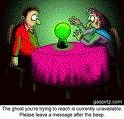 liberation, and global
liberation, and global  solidarity,
solidarity, 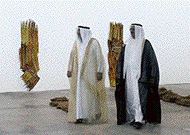 beyond the sublime contradictions of mourning. Undermining 'truth' to reveal the use of fiction [ideology]
beyond the sublime contradictions of mourning. Undermining 'truth' to reveal the use of fiction [ideology] 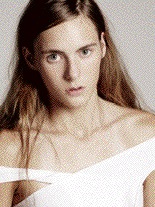 might be good enough as a project, never stable...with the temptation to lapse into bad faith, inauthenticity...
might be good enough as a project, never stable...with the temptation to lapse into bad faith, inauthenticity...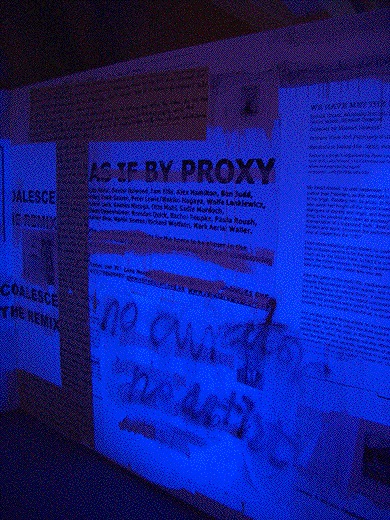 IV
IV
The eyes are not here
There are no eyes here
In this valley of dying stars
In this hollow valley
This broken jaw of our lost kingdom.
We grope together
And avoid speech
Gathered on this beach of the tumid river" [ from The Hollow Men, TS Eliot]
 to doubt the sincerity producing artifice and melodrama, crafted in the 'AlterModern' dictionary, evidence of the predominance of 'second restoration' ironic, avant-gardism, in Tom McCarthy's work on a dubious 'authentic', a privileged, artistic inauthenticity, [see his novel, Remainder] or Omer Fast's ambiguous use of Brecht's
to doubt the sincerity producing artifice and melodrama, crafted in the 'AlterModern' dictionary, evidence of the predominance of 'second restoration' ironic, avant-gardism, in Tom McCarthy's work on a dubious 'authentic', a privileged, artistic inauthenticity, [see his novel, Remainder] or Omer Fast's ambiguous use of Brecht's 'Verfremdung' applying alienation-fascination effects, in construced-deconstructed video, as a story-telling about murder is performed- deferred as symbolic murder, murder of the symboilc, but who is talking to whom, who is murdering whom? What Nicholas Bourriaud similarly feigns, for a new relative vocabulary, that dispenses with the circularity of Postmodernism, by supplanting it with 'AlterModernism' is the inferred Modern's
'Verfremdung' applying alienation-fascination effects, in construced-deconstructed video, as a story-telling about murder is performed- deferred as symbolic murder, murder of the symboilc, but who is talking to whom, who is murdering whom? What Nicholas Bourriaud similarly feigns, for a new relative vocabulary, that dispenses with the circularity of Postmodernism, by supplanting it with 'AlterModernism' is the inferred Modern's 
 final 'hiatus', that respectable theories and belief-systems disguise disreputable elements, origins, motives and functions, including his own reflexivity, ' thought means nothing' [Derrida] [verfremdung]
final 'hiatus', that respectable theories and belief-systems disguise disreputable elements, origins, motives and functions, including his own reflexivity, ' thought means nothing' [Derrida] [verfremdung]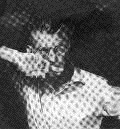
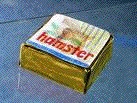 restored as the 'new international' beyond even cosmopolitanism, that is to say, citizenship of the world, against which I am / have nothing, as excluded 'within' included 'without' , badly named, falsely named, or over-written,
restored as the 'new international' beyond even cosmopolitanism, that is to say, citizenship of the world, against which I am / have nothing, as excluded 'within' included 'without' , badly named, falsely named, or over-written,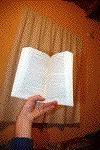
 from embodied to disembodied states, from the sleep of restlessness -the undead,
from embodied to disembodied states, from the sleep of restlessness -the undead,  alive again through 'metousiosis', the transitive substance, 'flesh' manufactured into 'flesh' hiding occult 'troubles' murky words,intimate and strange, home and not home, [cut] to mouth the 'special name' in the third person,
alive again through 'metousiosis', the transitive substance, 'flesh' manufactured into 'flesh' hiding occult 'troubles' murky words,intimate and strange, home and not home, [cut] to mouth the 'special name' in the third person, to emerge
to emerge from culture's algorithms ,
from culture's algorithms , 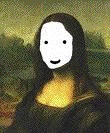 partial [ without teleological] object
partial [ without teleological] object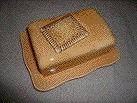 s of
s of 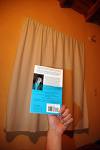
 desire
desire , now agitated without necessity, without anger, the Frankenstein Complex.
, now agitated without necessity, without anger, the Frankenstein Complex.  At dusk..the Fog, the Phantasm.
At dusk..the Fog, the Phantasm.


 fully in the light of day,
fully in the light of day, acceptance, entropy.
acceptance, entropy.  becoming clear, being, absolute.
becoming clear, being, absolute.
'This manifesto happily ignores what is going on in the world today - religious conflict, and a wistful need to return to the traditional, in the West. The world is swinging back, against progress, against modernity. This man with his manifesto concocted in the dark-rooms of insular art-dialectic carries on with the same tired message, the 20th century myth of relentless progress.' Miroslav Pomichal, Tate online, Altermodern Blog [Alter- branded with its sense of an interval to any single 'historical' necessity, Bourriaud disguises Vattimo's postmodernist theory of a liberating 'weak ontology' that aims to loosen the categories of history, of metaphysical origin, 'genus', or any discovery-drive for stable foundations of knowledge, etcetera, in postmodernity, yet hits below the belt, via its use of the 'strong ontology' of advertising, branding, to  rep
rep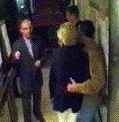

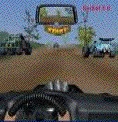 ossess the theory under a new name, which places the rhetoric of Vattimo's weak ontology, and its multiplicities through communication, under the sign of Altermodernism, [sounds like Armageddon] that 'snatches the soul', a kind of intellectual fatalism, anticipating a fatal mugging, so much so that Vattimo stands in against Vattimo - he recants, capitulates, like Galileo, always the last, being the first, and in a self-declaring triumphal moment of disidentification, Bourriaud, announces, or soft-sells 'progress' again, as the poison in transparency, against public dissymmetry, but 'for' impartiality, ethic, subordinated by subsuming it to a paradox of rejecting both 'progress' and its 'alternative', in accusative terms, 'Vattimo' - to whom is paid 'homage'; entering the uncritical dimension of the untouchable; that if all knowledge is pronounced 'provisional', it is more true to say, so equally to be useful, to promote, so as it progresses; equivalent to these new conditions and contingencies i.e. useful as a tool to reform the material without reference to the past, in a truly 'radical' and unarguably brilliant 'move' both from the museum to outside the museum, the institution lodges inside the art]. This is further distanced -embodied, from the past, by renaming 'origin' in the name of 'the removal of all origin', so that artists under this sign are paradoxically, in order to win, to lose everything at the same time, in the individual ascendance of each to power, to collective brand, yet at a remove from 'self-overcoming' and authorship, if to be embraced, welcomed 'home'. This discrete move from the curator is in reminiscence, palimpsest,
ossess the theory under a new name, which places the rhetoric of Vattimo's weak ontology, and its multiplicities through communication, under the sign of Altermodernism, [sounds like Armageddon] that 'snatches the soul', a kind of intellectual fatalism, anticipating a fatal mugging, so much so that Vattimo stands in against Vattimo - he recants, capitulates, like Galileo, always the last, being the first, and in a self-declaring triumphal moment of disidentification, Bourriaud, announces, or soft-sells 'progress' again, as the poison in transparency, against public dissymmetry, but 'for' impartiality, ethic, subordinated by subsuming it to a paradox of rejecting both 'progress' and its 'alternative', in accusative terms, 'Vattimo' - to whom is paid 'homage'; entering the uncritical dimension of the untouchable; that if all knowledge is pronounced 'provisional', it is more true to say, so equally to be useful, to promote, so as it progresses; equivalent to these new conditions and contingencies i.e. useful as a tool to reform the material without reference to the past, in a truly 'radical' and unarguably brilliant 'move' both from the museum to outside the museum, the institution lodges inside the art]. This is further distanced -embodied, from the past, by renaming 'origin' in the name of 'the removal of all origin', so that artists under this sign are paradoxically, in order to win, to lose everything at the same time, in the individual ascendance of each to power, to collective brand, yet at a remove from 'self-overcoming' and authorship, if to be embraced, welcomed 'home'. This discrete move from the curator is in reminiscence, palimpsest, 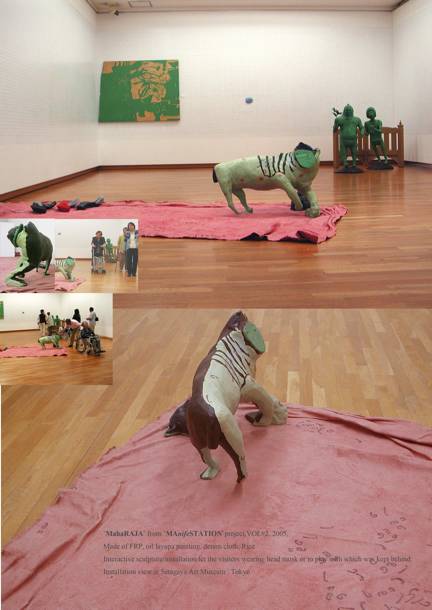 as the agreement of removal, part erasure, as contract the move from the artist's original desire to the acceptance of the curator's will as the strong sign of the socially-mediated, 'vetting' of an artist [where the royal sign is empirical, logical, positive], in this case 'covered' [approved] by a statement that in this scenario AlterModernism [ as Transavantguardia had] privileges and reaffirms the 'praxis' of the artist
as the agreement of removal, part erasure, as contract the move from the artist's original desire to the acceptance of the curator's will as the strong sign of the socially-mediated, 'vetting' of an artist [where the royal sign is empirical, logical, positive], in this case 'covered' [approved] by a statement that in this scenario AlterModernism [ as Transavantguardia had] privileges and reaffirms the 'praxis' of the artist 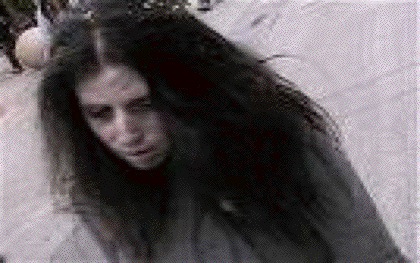 , in the unique and subjective approaches to the fluidity and new conditions of knowledge,
, in the unique and subjective approaches to the fluidity and new conditions of knowledge,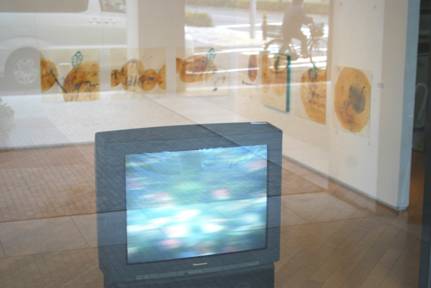 yet uses for examples hierarchical structures in metaphors of classical high culture e.g. opera and libretto, to 'explain' relationships of ideological structure to its 'supported' parts, incommensurable to condition of invention, and the correlation to the mechanisms of promotion of a 'new' theoretical product, as a force field, or a bullet proof glass screen, it appears to be in agreement but is betrayed. The non-affective field of praxis is assumed yet this is not declared by the mediocre as ressentiment, neither by curator nor artist nor a combination, or correlate of both.
yet uses for examples hierarchical structures in metaphors of classical high culture e.g. opera and libretto, to 'explain' relationships of ideological structure to its 'supported' parts, incommensurable to condition of invention, and the correlation to the mechanisms of promotion of a 'new' theoretical product, as a force field, or a bullet proof glass screen, it appears to be in agreement but is betrayed. The non-affective field of praxis is assumed yet this is not declared by the mediocre as ressentiment, neither by curator nor artist nor a combination, or correlate of both.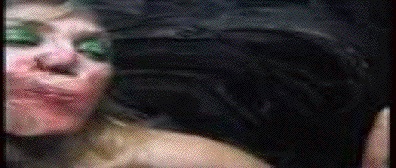


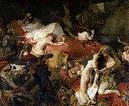
In the political caricatures of leaders and governments,  or the exaggerated iconographic physiognomies of 'mensch'
or the exaggerated iconographic physiognomies of 'mensch'  standing in for an alien zealousness, or of a lust inscribed by sinister and 'cleverly' written calculations, [the logic of perverse logic being: if we can't detect weapons, 'they' must be using an invisible new force beyond our technical capabilities, which we must actively destroy, and as a simpler solution, to annihilate, exterminate absolutely] is the narrated figure of the victim: the East, written in Fear, the Wholly Other, and the West, the decaying 'loop' of history, the corrupted Place Beyond Understanding, vis a vis the Condemned without Privilege, superfluity of the Death Drive, the Glorious Matyrdom, Endless Return, L'Enfer, One Without End,
standing in for an alien zealousness, or of a lust inscribed by sinister and 'cleverly' written calculations, [the logic of perverse logic being: if we can't detect weapons, 'they' must be using an invisible new force beyond our technical capabilities, which we must actively destroy, and as a simpler solution, to annihilate, exterminate absolutely] is the narrated figure of the victim: the East, written in Fear, the Wholly Other, and the West, the decaying 'loop' of history, the corrupted Place Beyond Understanding, vis a vis the Condemned without Privilege, superfluity of the Death Drive, the Glorious Matyrdom, Endless Return, L'Enfer, One Without End,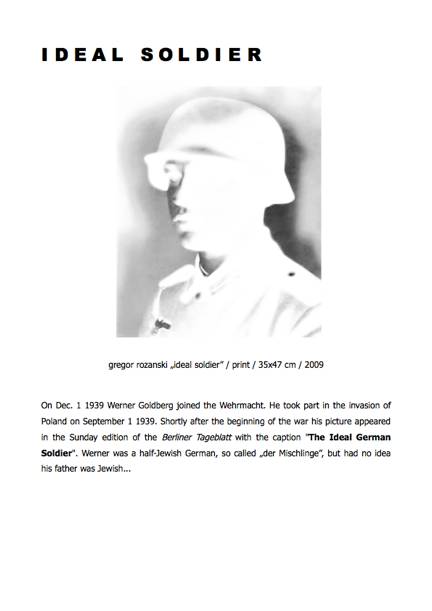 figured in the ecstatic-demonic Martyr, the Causation to Clearing, Homeland, Watchtower, Sublime Inadequate, [i.e.] holder of the truth unknown to itself
figured in the ecstatic-demonic Martyr, the Causation to Clearing, Homeland, Watchtower, Sublime Inadequate, [i.e.] holder of the truth unknown to itself  other than as acceptance
other than as acceptance 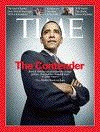 : in cognit
: in cognit ion of a sovereign, authentic failure, is yet to be written by degrees of truth, in a new vocabulary, that might tear open to what is no longer inadequate, and 'inauthentic'.
ion of a sovereign, authentic failure, is yet to be written by degrees of truth, in a new vocabulary, that might tear open to what is no longer inadequate, and 'inauthentic'. 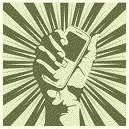 The metaphor 'knows itself' as the first condition of the cognition that 'wills it to not know itself', yet which adjusts and distributes, and finally presses the goddamn red button.
The metaphor 'knows itself' as the first condition of the cognition that 'wills it to not know itself', yet which adjusts and distributes, and finally presses the goddamn red button.  Metaphysical,
Metaphysical, 
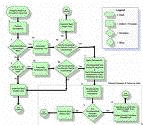 psychotic, spoken in the comforting rhetoric of common sense, as an appeal to 'God's Grace':
psychotic, spoken in the comforting rhetoric of common sense, as an appeal to 'God's Grace': 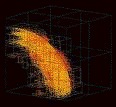 the destiny of the common man's common sense war on terror is to be located in the concrete 'use' of
the destiny of the common man's common sense war on terror is to be located in the concrete 'use' of  metaphor
metaphor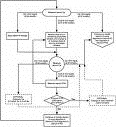 as the final disinterested example, in-itself meaningless: the End. Language.
as the final disinterested example, in-itself meaningless: the End. Language. 
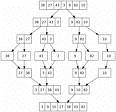 A shroud hanging over our now desolate yet familiar landscapes, made most unholy, constitutive of the body of redemption: smoking craters and a billion strewn
A shroud hanging over our now desolate yet familiar landscapes, made most unholy, constitutive of the body of redemption: smoking craters and a billion strewn 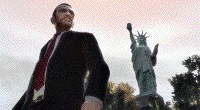 corpses.
corpses.
[...] as the daylight draws mercifully in on his reign of misfortune and calamity...the man who called himself 'the Decider' has left some gripping history. The last eight years have been so rich in epic imperial hubris that it would take a reborn Gibbon to do justice to the fall.
[Simon Schama in the Guardian 03/11/08 on Nowhere Man]

Violence and the necessity of contingency
The Mundane of Beauty
The Useless, L'Inutile, is sustained in our own present day media currency, standing in for the fossilisation of political necessity at the same speed, the 'any space whatever' beauty of ruins. 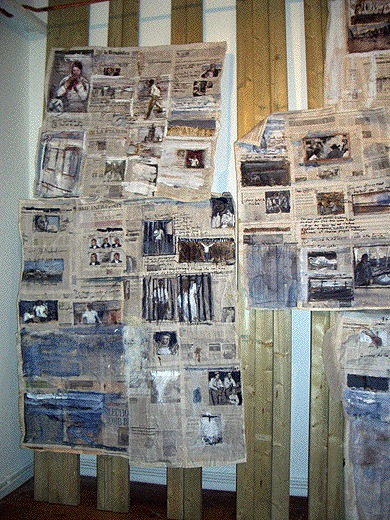 In technology it is argued by the collective reasoning of empirical science that has propelled the 'Big Bang' Machine, to seek out the ancestral, the colonising starship Voyager dispensing other facts more terrible and concrete in its wake. In that they are 'mundane', like Neil Armstrong's first impression walking on the moon, there is nothing to report - but the beauty of the absolute violence of disappointment, in an uninterested [truth of] existential incommensurability...of an ancestral, inaccessible space, the trace of a pre-existent affection in the originating moments of the Useless, a chance encounter, to embrace the rule of exception, as the rule of one's fallibility: the mundane of the universe itself, tenderly, violently, the exception, not the rule 'to boldly go where no man has gone before',
In technology it is argued by the collective reasoning of empirical science that has propelled the 'Big Bang' Machine, to seek out the ancestral, the colonising starship Voyager dispensing other facts more terrible and concrete in its wake. In that they are 'mundane', like Neil Armstrong's first impression walking on the moon, there is nothing to report - but the beauty of the absolute violence of disappointment, in an uninterested [truth of] existential incommensurability...of an ancestral, inaccessible space, the trace of a pre-existent affection in the originating moments of the Useless, a chance encounter, to embrace the rule of exception, as the rule of one's fallibility: the mundane of the universe itself, tenderly, violently, the exception, not the rule 'to boldly go where no man has gone before',  serves to provide evidence of a contradiction implied of mind and of thought to being, the echo of an original mathematical duplicity and the extreme point of difference. This is not incompatable with the decreasing of life, as served by the proof of an aging physical body and its mental atrophy.
serves to provide evidence of a contradiction implied of mind and of thought to being, the echo of an original mathematical duplicity and the extreme point of difference. This is not incompatable with the decreasing of life, as served by the proof of an aging physical body and its mental atrophy. 
Symbolic in Guy de Maupassant's short story L'Inutile BeautŽ Nature is qualified only in terms of correlation to the mimicries of an erotic, bodily functions, as the ecstatic 'unthought'.  I am reminded of 'Ma Mere', based on Bataille's novel...
I am reminded of 'Ma Mere', based on Bataille's novel...
Mother to Son:
'Pleasure begins with the worm in the apple...'
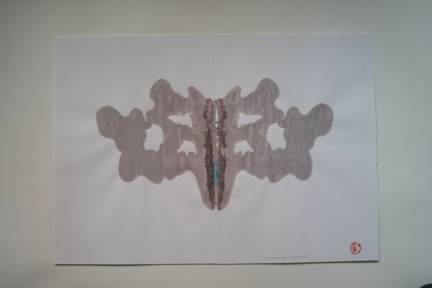
Uncertainty that defers love to an avoidance of the penetrative 'accommodation' that might not disappoint is reanimated in the rotten heart, the rotten flesh of incest. We reread Cartesian dualism as having coerced certainty as an active intention to not disappoint, by perverse activity itself, it appoints; the irresolvable linguistic contradiction beating of these rapid palpitations, the motor activity of reason's useful and useless insolubility, is to think of uselessness to the unthinkable and the uncertain as compromised by vulnerability to the possible disappointment of lost sovereignty of the 'matter-of -fact', of clinging instead to matter, in re-enforcing its sovereign state 'family affair' in perverse acts... Q.M. adjusts our attention to a term 'factiality' [the non-facticity of facticity] so as to unstick metaphysics from the vistas of thinking to erotico-religios concepts, 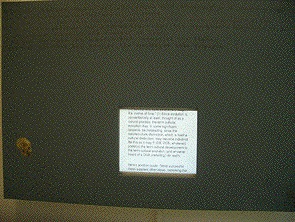 of mythology to the assembly of more or less interesting stories, of 'dull' matter, [the more dull, the more so the erotic possibility, overheard] yet to read without the necessity of thinking would be pure contradiction: rather it is the fecae that 'interest'; residual, list, data... In a last gasp of reason and analysis, of isolating metaphysics from religion, and recruiting the 'logic of the unthinkable' to disengage from 'the logic of faith', the correlate will never the less fuel thought's phantasms and listless re-enactments as relational affects of the primordial murk, incest, chthonic return, anus, fundamentalist, truth, 'inexpression'; slogans of belief leftover in the murk, 'freedom', 'honour', 'mission', 'evil', 'sacrifice' and by so doing force through denial, the event. What is incommensurable - the subjective or self-creative fiction, the objective fact, with the work of institution, government, and society as 'modulation'. Welded into the shape of a single unbreakable and progressive meaning-qualified, the Modern is to re-read as 'Institution', 'Government', 'Nation', conjoining 'mothers' with 'sons' at the banks of the tumid river. There are no eyes here. Let there be a 'reason', since the fact might be proven to cheat the Absolute, at the blind horizon of a correlation, with God
of mythology to the assembly of more or less interesting stories, of 'dull' matter, [the more dull, the more so the erotic possibility, overheard] yet to read without the necessity of thinking would be pure contradiction: rather it is the fecae that 'interest'; residual, list, data... In a last gasp of reason and analysis, of isolating metaphysics from religion, and recruiting the 'logic of the unthinkable' to disengage from 'the logic of faith', the correlate will never the less fuel thought's phantasms and listless re-enactments as relational affects of the primordial murk, incest, chthonic return, anus, fundamentalist, truth, 'inexpression'; slogans of belief leftover in the murk, 'freedom', 'honour', 'mission', 'evil', 'sacrifice' and by so doing force through denial, the event. What is incommensurable - the subjective or self-creative fiction, the objective fact, with the work of institution, government, and society as 'modulation'. Welded into the shape of a single unbreakable and progressive meaning-qualified, the Modern is to re-read as 'Institution', 'Government', 'Nation', conjoining 'mothers' with 'sons' at the banks of the tumid river. There are no eyes here. Let there be a 'reason', since the fact might be proven to cheat the Absolute, at the blind horizon of a correlation, with God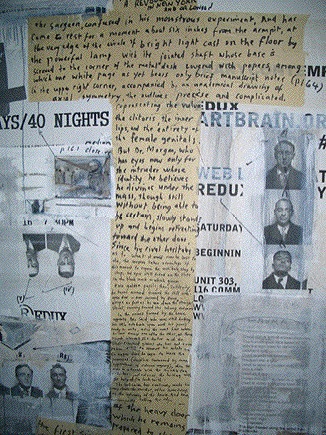 by alternating claims of truth with ethic, those of communitarian good, religious faith, i.e. as the supremacy of an uncritical consensus, to an embraceable Chaos. If, beyond the capacity of thought, only the mimetic and the hallucinatory are permit to appearance, to the stains and smudges, the noises and marks 'leftover' in and of language's old metaphors, clichŽs exchanged as correlational facts, ghoulishly feeding deep within the proof of subjective inconsistencies, what then is 'remainder'? What new metaphors?
by alternating claims of truth with ethic, those of communitarian good, religious faith, i.e. as the supremacy of an uncritical consensus, to an embraceable Chaos. If, beyond the capacity of thought, only the mimetic and the hallucinatory are permit to appearance, to the stains and smudges, the noises and marks 'leftover' in and of language's old metaphors, clichŽs exchanged as correlational facts, ghoulishly feeding deep within the proof of subjective inconsistencies, what then is 'remainder'? What new metaphors?
Making mistakes
'She wrote: I thought of Wis awa Szymborska, in particular the opening of "The End and The Beginning" '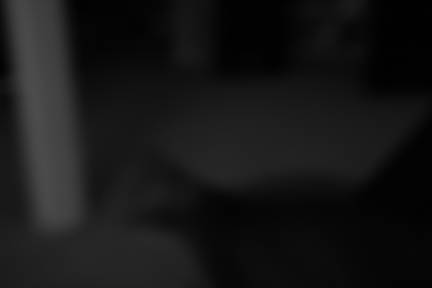
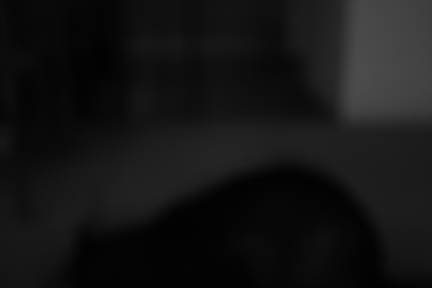
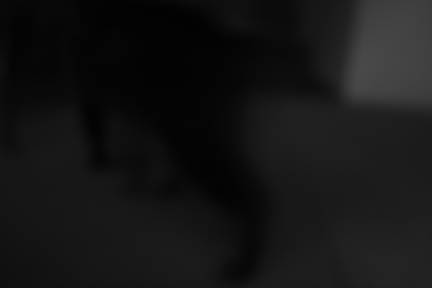

After every war
someone has to clean up.
Things won't
straighten themselves up, after all.
Someone has to push the rubble
to the sides of the road,
so the corpse-laden wagons 
can pass.
Someone has to get mired
in scum and ashes,
sofa springs,
splintered glass,
and bloody rags.
Someone must drag in a girder
to prop up a wall.
Someone must glaze a window,
rehang a door.
The ancients, too, troubled themselves with the mundane details, of trauma, repetition, destruction, death, and the drone of commentary (demolition by chorus), leftovers, matter without the status of bodies, before the law, with an undecideable judgement: what on earth is to be done with th e remainders?
e remainders? 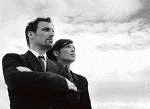 Inferno
Inferno
At the same time, naturally: total annihilation of the individual, a terminal disappearing act. "I mean to get out of here and come back again never!" Radical dispersal: gestures as magical passes caught at the critical moment between implosion and explosion. Oblivion, as big as he could paint it, as he stared right into it. A testament of despair, written in letters of fire. "A story like this can have no happy ending. Or better, shall we have a violent one?"
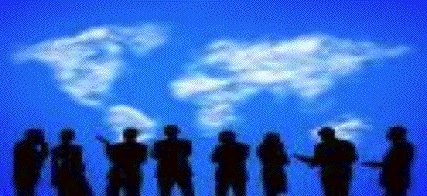
Like Phaeton, driven by a misplaced sense of courage and risking death, the 'story' narrates its audience, a careless and excitable reader, into as cool witness, and chorus [to the joyful destruction of the past], yet like the view of battle from its distance, the libretto spells out 'anathema', 'anachronism', useless beauty, to accompany the tragic sense of the Greeks, in scenarios lacking at once any respective correlation, and in retrospection, as monumental tragedy - to be returned as useless, as comic uselessness, overcoming the past - freedom in our own time; in the death throes of politics and the edgy 'professionalism' of the educated class moving across to openly embrace modernization, 'classless' free m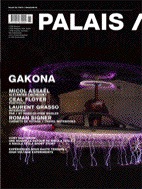 arket business and media spectacle is the 'ethical' form of use [for profit] pleasure; to master the machinery [of the mind], as one who dares to win privilege, there is no deeper, collective human value or remainder of ancient aristos. To trivialise truth in a knowing sophistical indifference, we may draw sustenance whatever the intended outcome, or unintended loss, indeed on the redress of staging mythological narratives of a 'useless' mission to drive culture and history as business.
arket business and media spectacle is the 'ethical' form of use [for profit] pleasure; to master the machinery [of the mind], as one who dares to win privilege, there is no deeper, collective human value or remainder of ancient aristos. To trivialise truth in a knowing sophistical indifference, we may draw sustenance whatever the intended outcome, or unintended loss, indeed on the redress of staging mythological narratives of a 'useless' mission to drive culture and history as business.  The Owl of Minerva no longer arrives late. So we read its twists of fate and irony in the wounds of time, provident by / of nostalgia, in whose name 'the rarest of birds, is, finally, extinct'. Intention retains only a small part of consciousness and life [a universe, a trace] and experience [a sham] is marked as history's stigmata, carved in the repetitious messages of art, of a desultory, 'useless beauty' and an aimless wandering through time that ends here. Cinema more than any other form perpetuates itself in the self-depictions of a tortured body, the photograph as half- conscious, alluring, cadaverous ghoul returning her gaze in the mirror, the dull eyed witness to murderous acts - reflecting her beauty - and the birth of a beginning and the end of her days...
The Owl of Minerva no longer arrives late. So we read its twists of fate and irony in the wounds of time, provident by / of nostalgia, in whose name 'the rarest of birds, is, finally, extinct'. Intention retains only a small part of consciousness and life [a universe, a trace] and experience [a sham] is marked as history's stigmata, carved in the repetitious messages of art, of a desultory, 'useless beauty' and an aimless wandering through time that ends here. Cinema more than any other form perpetuates itself in the self-depictions of a tortured body, the photograph as half- conscious, alluring, cadaverous ghoul returning her gaze in the mirror, the dull eyed witness to murderous acts - reflecting her beauty - and the birth of a beginning and the end of her days... 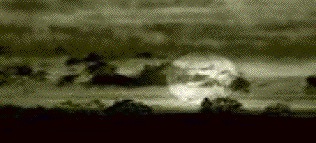
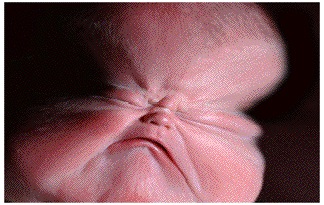
This uselessness is revived as beauty in the self-righteous act, a benign and justified Murder of Faith, the Lutherian-like proclamation of resistance as self-belief, and equally as a chain of signifiers marking out the failure of the self in fragments, there are many here among us who feel life is but a joke... the double bind of affirming humanity as non-ideal and unromantic, scorning anti-humanism, ironic in the sympathetic characterisation redolent of psychopath narratives in cinema, e.g. Der Baader Meinhof Komplex, [Uli Edel, 2008] a film that revives, momentarily, the question of Modernism's veracity, the structural 'truth to material' construction and historical accuracy purported as 'realism', only to defer its possibility in hyperrealism and mythos: the realist, disinterested works by e.g. Straub/Huillet not only in terms of an cinema's interest and indifference to portrayals of violence and death, but as counter-marker of general tendency to submerge the 'fact', are to be recalled and absorbed as postmodern anti-idealism, falling out as ahistorical, ironic / cynical invalidity; directed to analyses of a redundant 'manifesto' politics affiliated to the power of the picnoleptic, the half-dreamt allure, 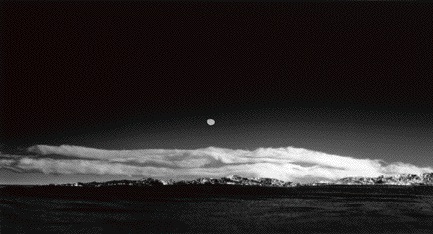 a given time between a cinemati
a given time between a cinemati c 'shot'
c 'shot'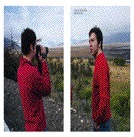 , and its sudden reappearance elsewhere, for its
, and its sudden reappearance elsewhere, for its  'passion
'passion 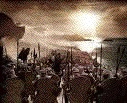 for the unreal', action is forged in pledges of love and terror, as dreams flowering in the flashes of picnoleptic sleep. The uncertainties of a process of truth narrate a collective belief in the cinematic image of matyrdom, sacrifice, suicide above the real. What is to be useful [as also in true love's uselessness to any state of conformity that it is perforce to oppose] to any revolution
for the unreal', action is forged in pledges of love and terror, as dreams flowering in the flashes of picnoleptic sleep. The uncertainties of a process of truth narrate a collective belief in the cinematic image of matyrdom, sacrifice, suicide above the real. What is to be useful [as also in true love's uselessness to any state of conformity that it is perforce to oppose] to any revolution 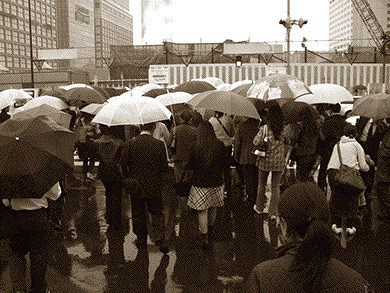 that can no longer defend the epicentre to belief in the messianic sacrifice to the world- the binary logic of authentic/inauthentic sequences
that can no longer defend the epicentre to belief in the messianic sacrifice to the world- the binary logic of authentic/inauthentic sequences 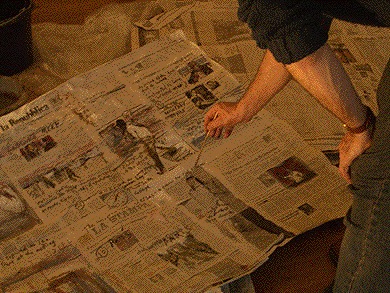 is more appropriately sacrificial to the logic and dynamic of technology [esp. in the victory of engineering of a society, something that concerned the neo-conservative school of Leo Strauss, and belonging to political Islam alike, to create the conditions, to manipulate fear, as an ideology]
is more appropriately sacrificial to the logic and dynamic of technology [esp. in the victory of engineering of a society, something that concerned the neo-conservative school of Leo Strauss, and belonging to political Islam alike, to create the conditions, to manipulate fear, as an ideology] 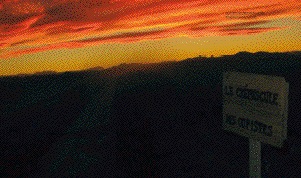
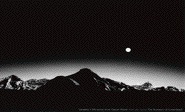
U.S. domination in the material terms of consumption, as dying animal, state of predatory cannibalism, providing the images of death as idiot [ 'McDonaldisation'] - in Q.M's terms, as far away as possible from a 'necessity of contingency'. 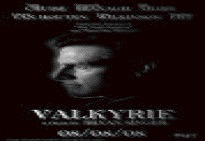 Here Useless Beauty can be displaced from Nature to what can be interrogated as a given [of whose or what nature] - a political urgency that is drawn from what is reactionary, outmoded, i.e. the ideology,
Here Useless Beauty can be displaced from Nature to what can be interrogated as a given [of whose or what nature] - a political urgency that is drawn from what is reactionary, outmoded, i.e. the ideology, 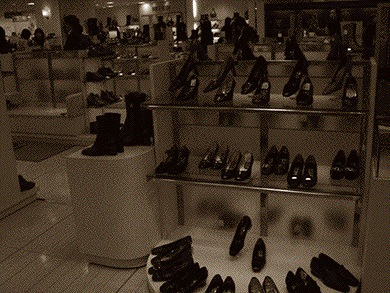 overlooked and ineffectively resistant, as always partial and unknowable, always unawares. The uselessness of praxis to consumption is to be admired, one asks, if the function of art as resistance is now accepted, long deceased,
overlooked and ineffectively resistant, as always partial and unknowable, always unawares. The uselessness of praxis to consumption is to be admired, one asks, if the function of art as resistance is now accepted, long deceased, 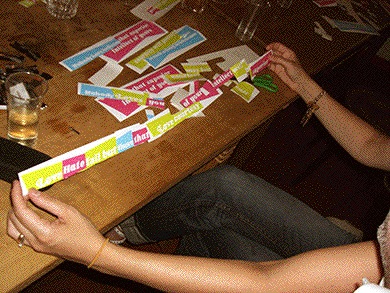 the mourning is
the mourning is 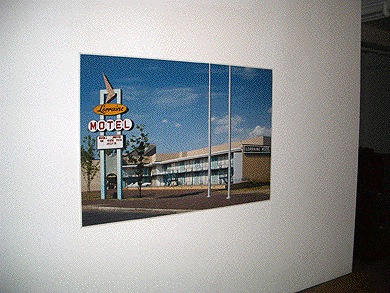 complete.
complete.
'Yes, but I say that Nature is our enemy, 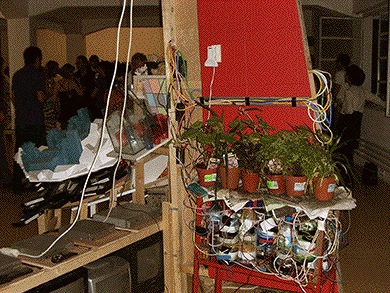 that we must always fight against Nature, for she is continually bringing us back to an animal state. You may be sure that God has not put anything on this earth that is clean, pretty, elegant or accessory to our ideal
that we must always fight against Nature, for she is continually bringing us back to an animal state. You may be sure that God has not put anything on this earth that is clean, pretty, elegant or accessory to our ideal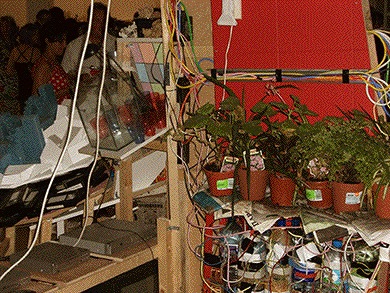 [...] idealising it as an artist and by explaining it through science, doubtless making mistakes, but finding ingenious reasons, hidden grace and beauty, unknown charm and mystery in the various phenomena of Nature. [Useless Beauty, Guy de Maupassant.]
[...] idealising it as an artist and by explaining it through science, doubtless making mistakes, but finding ingenious reasons, hidden grace and beauty, unknown charm and mystery in the various phenomena of Nature. [Useless Beauty, Guy de Maupassant.]
Helpless Statements and Painting's Abandon
Jasper Johns interviewed by David Sylvester had suggested in his answers that it might be more 'useful', concerning the process of making his work, to be better served by a surrender to 'helpless statements' rather than aspiring to intentional ones, and that one's energy or time should be 'wasted' in achieving a state where something can no longer be avoided...the 'useless'? Arguably an approximate and fairly good definition of the 'for me' experience [infinitely variable] and at the same time, a fuzzy logic, belonging of the thing 'in itself'. 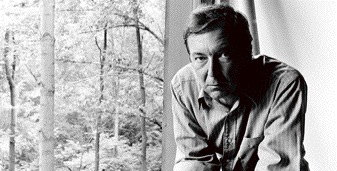
In Artforum October 2008 Nick Mauss discussed this 'in itself' of painting as a weird and embarrassing encounter, specific to the politicised practice of Jochen Klein. Landscapes without geneology, ancestrality, heterotopias that call into being something that has not yet existed., which cannot exist, yet exist as formal statements, in contradiction, as something thinkable. What is not a contradiction in Klein's work is the critical-political framework versus the pleasure of painting. 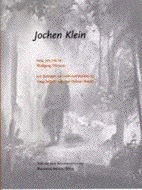 'Klein invested deeply in the potential for painting to express human emotion in the first person, fluttering on Hazlitt's brink of nothingness, but he also seems to share its limitations with us. His Romantic pockets were very deep but he seemed hardly nostalgic for an earlier and simpler life for painting. No, it is another thing entirely. I recall what Johann Dahl once said about Friedrich because it applies here so well: 'Friedrich saw in a particularly tragic way... the limits of what can be represented in painting'. [Ronald Jones]
'Klein invested deeply in the potential for painting to express human emotion in the first person, fluttering on Hazlitt's brink of nothingness, but he also seems to share its limitations with us. His Romantic pockets were very deep but he seemed hardly nostalgic for an earlier and simpler life for painting. No, it is another thing entirely. I recall what Johann Dahl once said about Friedrich because it applies here so well: 'Friedrich saw in a particularly tragic way... the limits of what can be represented in painting'. [Ronald Jones]
What precedes and exceeds one's uselessness, ineffectuality? As always and already as subjects the products of ideology. Useless here is a term of abuse usually reserved by an authority, a Statist injunction, or challenged by an alter- peer group, as Baader Meinhof Gang, 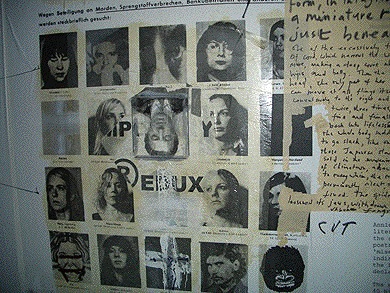 yet describes perfectly both the reflexivity of one's own dogged correlations of thought, the interpellation of signs, and the cynicism of despair. Is it not precisely an ideological, reflexive self-policing that informs the directive to reassemble the era of the 'manifesto', as a faked up 'truth function'? Or couched in Hans-Ulrich Obrist's policing of art-rhetoric of the 'marathon' of re-enactments of manifestos, The Future Will Be [compiled by H-U O] that he suggests in their compliance to a curatorial conceit of the 'ensemble', an overlooked identification as 'wish' in his own publicity, as the fantasy of the Dream Machine,
yet describes perfectly both the reflexivity of one's own dogged correlations of thought, the interpellation of signs, and the cynicism of despair. Is it not precisely an ideological, reflexive self-policing that informs the directive to reassemble the era of the 'manifesto', as a faked up 'truth function'? Or couched in Hans-Ulrich Obrist's policing of art-rhetoric of the 'marathon' of re-enactments of manifestos, The Future Will Be [compiled by H-U O] that he suggests in their compliance to a curatorial conceit of the 'ensemble', an overlooked identification as 'wish' in his own publicity, as the fantasy of the Dream Machine, 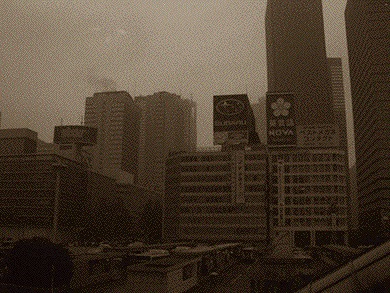 a future engineered, in the erotic-logic of power?
a future engineered, in the erotic-logic of power? 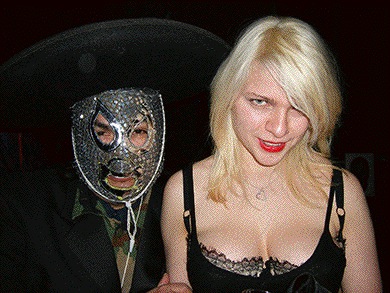 Phaeton is again useful as an allegory. If we apply 'fuzzy' logic, it would appear to more or less suggest the foreclosure on absolute possibility, since by listing all components, or suggesting by degree, it undoubtedly succeeds in stamping out any necessity of impossibilities or contingencies. It might be useful to read, again, of the failure of insurrections, manifestos against manifestos, and the persistence of religion, the cynical marketing of art, in the writings of Gilles DauvŽ [penned as Jean Barrot].
Phaeton is again useful as an allegory. If we apply 'fuzzy' logic, it would appear to more or less suggest the foreclosure on absolute possibility, since by listing all components, or suggesting by degree, it undoubtedly succeeds in stamping out any necessity of impossibilities or contingencies. It might be useful to read, again, of the failure of insurrections, manifestos against manifestos, and the persistence of religion, the cynical marketing of art, in the writings of Gilles DauvŽ [penned as Jean Barrot].
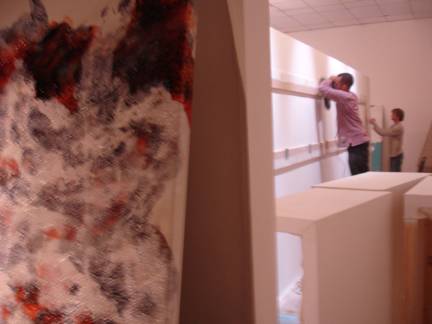

Violence in Thought and Deed
In No Country for Old Men, [Coen Brothers, 2007] the perfect figure of the transcendental violence of the Mythos is comically [or tragically, if meaning is at stake by correlation] presented as an avenging philosophy of an Absolute Violence, the divine comedy, for-itself, in the eternal return, destroys the tension between real and imaginary, something that encourages the victim towards forming a circular logic from correlation of self as inauthentic vis a vis authentic, out of her mis-communication in the discourse, defending (trauma) the ensuing dogmatic narrowing of thinking, found in the pseudo-affirmations of obsession: re-enactments to affirm the self in restoration and repetition. And equally imagined is the banal and mundane matter of fact of a fanatic murderer without reason other than the passion for an economy of means to that end. Herein lies the paradox of 'useless evil', the whole persona unaware, is the world, turned upside down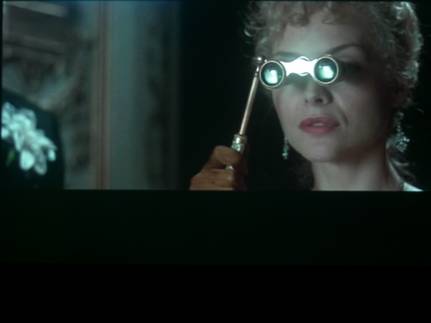
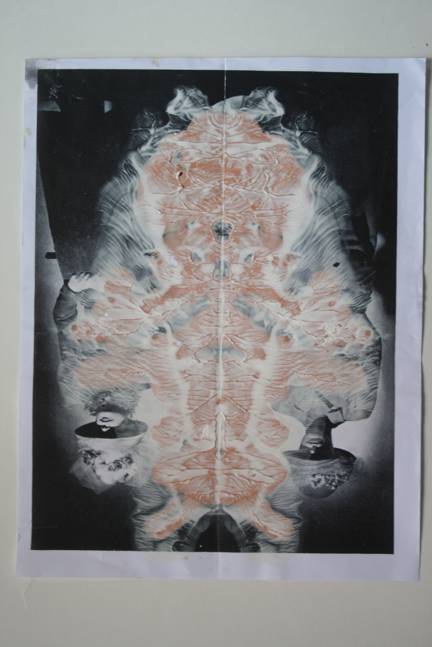 as ultimately funny, in the unfounding of the event,
as ultimately funny, in the unfounding of the event,  turning round the monstrous embedded as art's Master Signifier insinuated in a de-sacralising movement, like a moth to / from the flame. The whole point of evil is not so much that it is funny, but entertaining.
turning round the monstrous embedded as art's Master Signifier insinuated in a de-sacralising movement, like a moth to / from the flame. The whole point of evil is not so much that it is funny, but entertaining.
To turn pale
Virtual Any-Space Whatever
If a machine 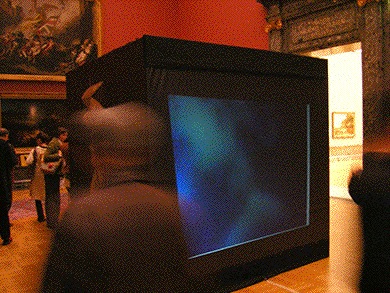 were to take on the characteristics of a complex intelligence /organism and begin producing rapid mutations from ideal forms, its sense of purpose would be to alert a significant danger to the stability of any 'projected' reality to the body, then the unfounding of existence is at a momentous point when the inauthentic chaotically reproducing itself at speed or simulacra produced of rapidity of representations, no longer is contained by the technology that produced it originally, destroys its origin,
were to take on the characteristics of a complex intelligence /organism and begin producing rapid mutations from ideal forms, its sense of purpose would be to alert a significant danger to the stability of any 'projected' reality to the body, then the unfounding of existence is at a momentous point when the inauthentic chaotically reproducing itself at speed or simulacra produced of rapidity of representations, no longer is contained by the technology that produced it originally, destroys its origin, 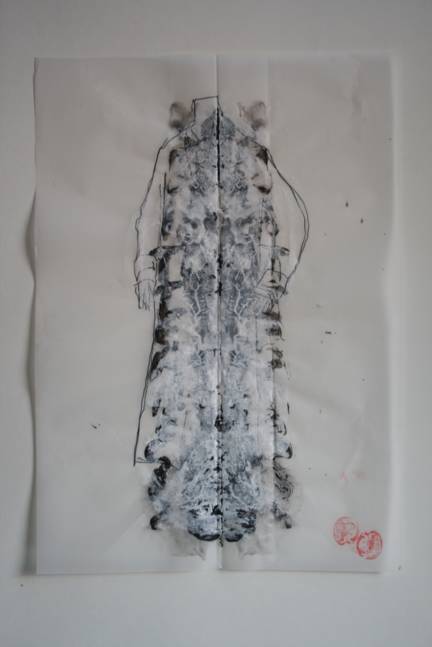 i
i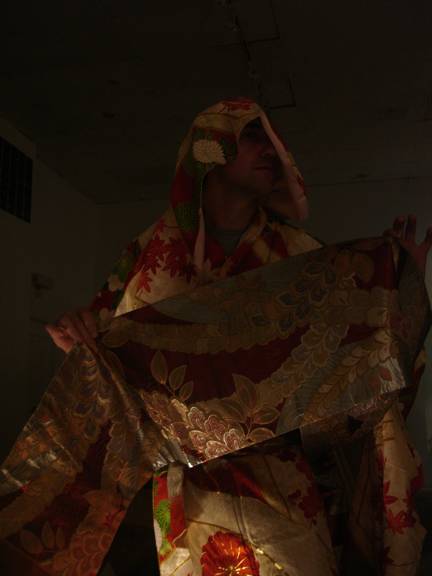 ts inhibited violence, but that it has now 'entered', and 'inhabits' the world screen. Imagine a camera producing and freezing thousands of images at a level acute enough to succeed in stopping time, grinding it to a halt, by recording of all possible movements in a particular concentrated view of space, onto one frozen screen, to force an object into being, through it, as from bone, say, into clay, or a regressed proto form, that had no relation to what was recorded on the screen.
ts inhibited violence, but that it has now 'entered', and 'inhabits' the world screen. Imagine a camera producing and freezing thousands of images at a level acute enough to succeed in stopping time, grinding it to a halt, by recording of all possible movements in a particular concentrated view of space, onto one frozen screen, to force an object into being, through it, as from bone, say, into clay, or a regressed proto form, that had no relation to what was recorded on the screen.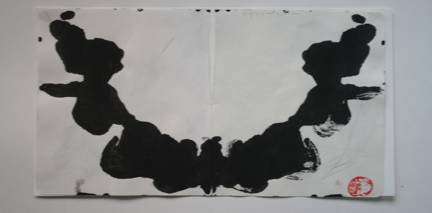 This weird encounter [the disaster] is acknowledgement of the Real, the progeny of dream machinery, constituted from undesirable phantasmatic material, made from visceral disorder into object, executed as experience. Tabula Rasa.
This weird encounter [the disaster] is acknowledgement of the Real, the progeny of dream machinery, constituted from undesirable phantasmatic material, made from visceral disorder into object, executed as experience. Tabula Rasa.
'The Comtesse de Mascaret came down the steps just as her husband, who was coming home, appeared in the carriage entrance. He stopped for a few moments to look at his wife and turned rather pale. The countess was very 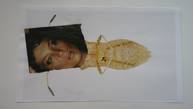 beautiful, graceful and distinguished looking, with her long oval face, her complexion like yellow ivory, her large gray eyes and her black hair; and she got into her carriage without looking at him, without even seeming to have noticed him, with such a particularly high-bred air, that the furious jealousy by which he had been devoured for so long again gnawed at his heart.
beautiful, graceful and distinguished looking, with her long oval face, her complexion like yellow ivory, her large gray eyes and her black hair; and she got into her carriage without looking at him, without even seeming to have noticed him, with such a particularly high-bred air, that the furious jealousy by which he had been devoured for so long again gnawed at his heart. 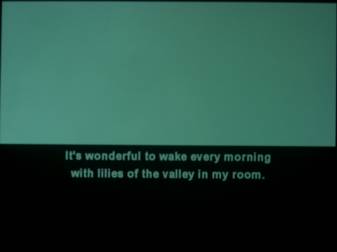 ' [Useless Beauty, G.de.M]
' [Useless Beauty, G.de.M]